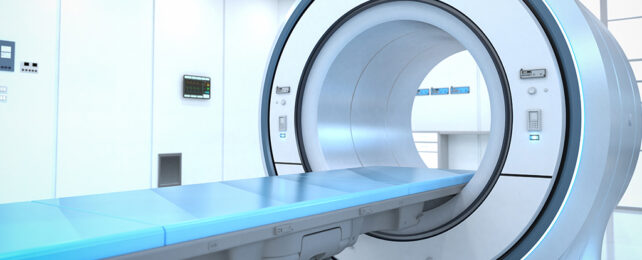A 57-year-old Wisconsin woman received superficial wounds to her right buttock earlier this year when a concealed firearm on her person was subjected to the powerful magnetism of an MRI device.
Though her injuries were relatively minor, consisting of a clean entry and exit through subcutaneous tissue, the incident is yet another reminder of the potentially deadly consequences of taking a loaded firearm into places where loaded firearms have no place.
Detailed in a report by the US Food and Drug Administration, the case follows a shockingly similar incident that took place in Brazil just a few months prior, in which a 40-year-old man died as a result of injuries sustained when his own gun fired in close proximity to an active MRI scanner.
Just how the unnamed woman in the more recent incident managed to slip her handgun past medical staff isn't clear, with personnel reporting the patient had undergone the standard screening procedure for potentially magnetic items, one that includes specific references to weapons.
MRI devices are seriously powerful, in all senses of the word. Not only are they useful for producing detailed images of our squishy bits for specialists to diagnose injuries and illnesses, they operate by producing incredibly strong electromagnetic fields.
Those fields twist the protons in your tissues so they all line up in the same direction like tiny compasses. When jiggled with a follow-up pulse of radio waves, the protons take differing amounts of time to realign; differences that translate into variations in tissue, which can be used to build an anatomical map.
While all protons wiggle and waggle in a magnetic field, the arrangements of particles in ferromagnetic materials – such as the elements iron, nickel, and cobalt – amplify this effect. Bathed in an MRI's typical magnetic field of around 1.5 to 3 tesla, there's less wiggling and more heating, shaking, and leaping.
That's the physics behind the basic rule of keeping metallic objects far away from an MRI. That includes piercings, jewelry, coins, phones, crucifixes, Iron Age artifacts, throwing stars, toy cars, lucky horseshoes, magnetic eyelashes, house keys, and, of course, firearms.
It's possible these (and other) unfortunate incidences are simply cases of feeling so at ease with packing heat that the weapon's presence just slips one's mind.
Given the risk of severe injury or death to one's self and others, stories like these can only serve as a reminder to double check and then check again if you're armed before entering a tube pumping out the magnetism of a few thousand fridge magnets. It just might save your ass.
